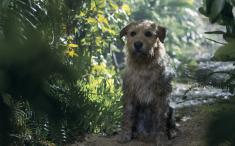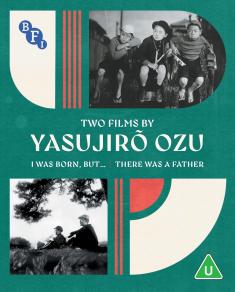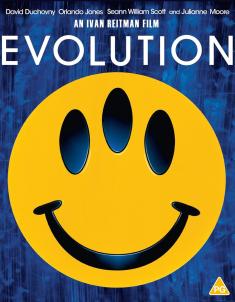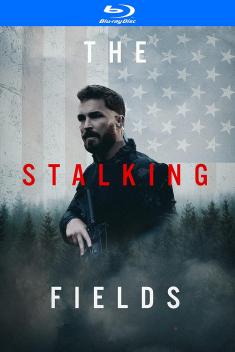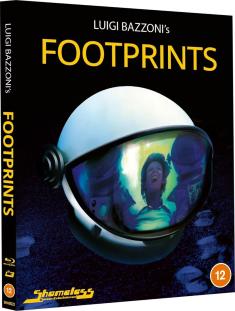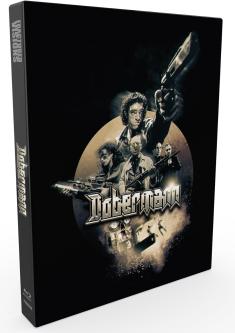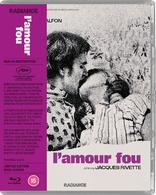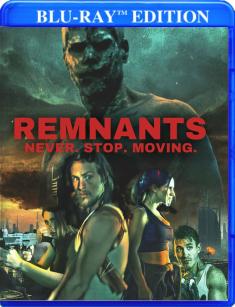Dune (UK Import)
Overview -
In a series of reviews and blog posts filed under the heading "Auteur Theory," I have made it a project to revisit the career of cult director David Lynch, rewatch his entire feature filmography in sequential order, and chart the progression of this iconoclastic artist through both his highs and lows.
The movie review portion of the following article was originally written for and first published on my personal 'Dune' movie merchandise web site. [Ed: That site is now defunct, sorry!] It is being reprinted here with permission (from myself). Because I have a very deep, personal connection to this movie, I reserve the right to retain the copyright to that text. The remaining technical portions of the article are new and exclusive to High-Def Digest.
- Joshua Zyber
"Auteur Theory" Article Index
- 1977: 'Eraserhead' (UK Import Blu-ray)
- 1977: 'Eraserhead' (Japanese Import Blu-ray)
- 1980: 'The Elephant Man' (French Import Blu-ray)
- 1984: 'Dune – Extended Edition' (German Import Blu-ray)
- 1986: 'Blue Velvet' (UK Import Blu-ray)
- 1990: 'Twin Peaks: Pilot Episode' (VUDU)
- 1990: 'Wild at Heart' (UK Import Blu-ray)
- 1990: 'Wild at Heart' (French Import Blu-ray)
- 1990: 'Industrial Symphony No. 1: The Dream of the Brokenhearted' (DVD)
- 1990: 'American Chronicles' (VHS)
- 1992: 'Twin Peaks: Fire Walk With Me' (UK Import Blu-ray)
- 1992: 'Twin Peaks: Fire Walk With Me' (Japanese Import Blu-ray)
- 1992: 'On the Air' (Laserdisc)
- 1993: 'Hotel Room' (Laserdisc)
- 1997: 'Lost Highway' (Japanese Import Blu-ray)
- 1997: 'Lost Highway' (UK Import Blu-ray)
- 1999: 'The Straight Story' (Japanese Import Blu-ray)
- 2001: 'Mulholland Drive' (UK Import Blu-ray)
- 2006: 'Inland Empire' (UK Import Blu-ray)
- 'David Lynch: Images' (Book)
- 'Wild at Heart' Deleted Scenes
- 'The Secret Diary of Laura Palmer' (Book)
- 'The Autobiography of F.B.I. Special Agent Dale Cooper' (Book)
- 'Diane… The Twin Peaks Tapes of Agent Cooper' (Audiobook)
A world beyond your experience, beyond your imagination.
Storyline: Our Reviewer's Take
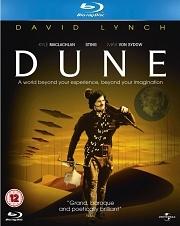
"The sleeper must awaken."
What is it about certain movies that can drive a person to obsession? When David Lynch's film adaptation of 'Dune' premiered back in 1984, it was released to almost universal scorn. Fans of the Frank Herbert novel upon which it was based despised it for daring to leave out a couple paragraphs of the author's verbose prose and changing a detail or two. (Oh no, the desert warriors now fight with guns rather than kung-fu. The heresy!) General moviegoers lured to the multiplex by ads that promoted it as the next 'Star Wars' couldn't make heads or tails of its complicated story, were bored by its lack of major action scenes, and had no idea how to interpret the filmmaker's stranger affectations. Roger Ebert declared it the worst movie of the year. Budgeted at over $40 million, it was one of the most expensive science fiction productions made up to that point. (For reference, the prior year's 'Return of the Jedi' cost only $32 million.) And it was a tremendous box office bomb. For years afterward, any mention of 'Dune' would invariably be in the context of biggest movie flops, categorized with the likes of 'Cleopatra' and 'Heaven's Gate'. Even to this day, the film is still considered by most movie-watchers a baffling failure. Its director has completely disowned it.
None of that matters a bit. I love 'Dune'. No, I adore 'Dune'. I've watched it dozens upon dozens of times, in 35mm and on every home video format that has ever existed. I know the film on a practically frame-by-frame basis. I can recite major portions of the dialogue verbatim. I've amassed a sizable collection of memorabilia and merchandise related to it. Of the thousands of movies I've watched in my life, I would never be foolish enough to call 'Dune' the best film I've ever seen, but it is my favorite. I have no shame about that, no matter how few people will ever understand it. The way some people are fixated on 'Star Wars' or 'Star Trek', I am utterly, rapturously, obsessed with 'Dune'.
And the movie continues to reward me.
The circumstances by which an eccentric cult filmmaker like David Lynch could ever be put in charge of a major science fiction production still seem impossibly unlikely. With only two features on his resumé at that time – the bizarro midnight-circuit oddity 'Eraserhead' and the stately black & white historical drama 'The Elephant Man' – the director found himself courted by no less than George Lucas to direct the then-titled 'Revenge of the Jedi'. Lynch turned that offer down because he didn't want to work on a sequel to someone else's original material. (I suspect he wasn't too keen on all the teddy bears either.) Finding him available, Dino De Laurentiis promptly scooped Lynch up for 'Dune', a book that had already been through several failed attempts at adaptation by the likes of Alejandro Jodorowsky and Ridley Scott. Lynch had never even heard of the novel at the time, but promptly devoured it and found many opportunities to bring his own vision to the universe Herbert had created. He accepted the challenge. After a grueling four-year production, the resulting film is certainly one of the strangest big-budget extravaganzas ever made.
I'll be the first to admit that narrative coherency is not the picture's strongpoint. The Frank Herbert novel was quite long and very densely plotted, an epic tale of politics, religion, war, science, philosophy, environmentalism, and adventure. The movie attempts to cram all those elements into a 2 hr. 17 min. length and winds up greatly condensing many of the storylines. It drops the audience into the middle of Hebert's complex universe with insufficient introduction and little attempt to explain the reams of confusing alien terminology. Even the book needed a glossary to help readers navigate the likes of Mentats, Bene Gesserits, Gom Jabbars, ornithopters, crysknives, and the Kwizatz Haderach. The movie has no such handy reference that viewers can refer to. When the Fremen leader tells our hero to, "Take this Kiswa Maker Hook of our sietch," almost none of those words have been defined in proper context for the audience to understand.
As if that weren't perplexing enough, characters often go by multiple names. The lead Paul Atreides is known as either Usul or Muad'Dib at different points in the story, for reasons not sufficiently spelled out here. If you aren't already familiar with the book, it's easy to get hopelessly lost. Some storylines are so compressed that the movie has to bridge them with frustrating and clunky voiceover narration. The major romantic subplot is covered in its entirety by the single line, "Paul and Chani's love grew," as if that were all we'd need to know about why these two characters who just met are all of a sudden acting like they're married. And there's no avoiding the fact that the entire last act of the movie falls completely apart, from its indifferently-directed huge battle sequence to the absurdly anticlimactic final line.
In terms of storytelling, the film is clearly a mess. But what a wonderfully rich, elaborate, and fascinating mess it is. To be honest, plot clarity has never held much interest for David Lynch. He's a visual artist, more concerned with evoking moods and atmosphere than exposition. His best films (such as 'Blue Velvet' and 'Mulholland Drive') can be argued to have little narrative logic at all, but work instead based on emotional logic. Scenes connect and stories progress because Lynch makes you feel them bind together, even when the puzzle pieces don't fit together easily. He's a filmmaker obsessed with details and textures, and tells his stories more through their arresting images than their dialogue. The director has never been much concerned with the mechanics of staging an action scene, but he's called upon to wrangle a couple of big ones here. The results feel disappointingly perfunctory; you can tell that Lynch just wants to get them out of the way so that he can skip ahead to the juicier character moments to follow. As you can imagine, this creates something of a conflict with the needs of the Hollywood studio system, especially when it comes to adapting an existing literary property with a huge fan base.
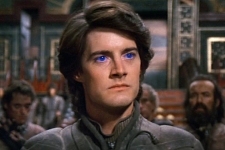 |
Yet for all its failings of story clarity, Lynch's 'Dune' is nonetheless a faithful adaptation of Herbert's novel, sometimes too faithful. It retains most of the author's arch dialogue, much of which is not inherently cinematic in nature, and tries to keep as many of the major subplots as it can pack in. The picture would have been better served as a movie if Lynch had been less faithful to the book and had streamlined out some of the less crucial storylines, even at the expense of upsetting the most fervent 'Dune' fans. Lynch's attention to the nuances of character is a spot-on perfect replica of the book's. The movie's huge multi-national cast nails every role. The film may change some of the details of the plot, but it's always true to the spirit and intention of Frank Herbert's story and characters, a claim that cannot be made of the later cable TV remake/re-adaptation. (Some fans are under the deluded impression that the cheap-jack miniseries is more faithful to Herbert, even though it eviscerates the entire first 1/3 of the book and misinterprets all of the major characters. But that's an argument for another day.)
Like the best adaptations, Lynch's film attempts to be more than just an illustrated version of the novel. The director brings plenty of his own sensibilities to the production. This is unmistakably a David Lynch film through and through. The little touches, like the Baron Harkonnen's repugnant facial sores, Beast Rabban ripping the tongue out of a cow carcass to munch on, or the cat with a mouse sutured to its back, are pure David Lynch and some of the most memorable images in the movie.
For visual imagination alone, 'Dune' is wondrous to behold. Although the Frank Herbert novel was intricately detailed in story and character, the text was curiously lacking in visual descriptions. This allowed Lynch to step in and art-direct the hell out of the picture. The story spans four different planets, each with its own unique culture and history. As depicted here, each has been given an ornate and distinctive production design. The detailed sets and costumes borrow elements that span the centuries from classical Venetian architecture to contemporary industrial wastelands, fused together into a rich tapestry that imagines the future without looking gimmicky or "futuristic." The designs so perfectly fit the story that it's almost impossible to re-read the Herbert novel without picturing the Lynch film in your head. In discussing it, Frank Herbert himself said, "As far as I'm concerned, the film is a visual feast. I would love to have some of the scenes, as stills, to frame and have around me."
 |
Unfortunately, some of the dated blue-screen visual effects haven't aged well, and frankly some weren't very good even by 1984 standards. However, the models and miniatures tend to hold up, as do the lovely matte paintings. The use of foreground miniatures to add depth and scope to wide shots is still impressively seamless in many scenes. Fresh off his 'E.T.' success, Carlo Rambaldi was brought in for creature effects; the Guild Navigator he built per Lynch's design – a sort of giant wrinkled brain that floats in a tank of orange gas, with deformed dwarf appendages, bulging eyes, and a suspiciously vaginal mouth – is one of the most freakily surreal monsters ever put to celluloid.
Even at their least photorealistic, the images Lynch was attempting to create with the special effects are always intriguing. Force fields surround the Atreides soldiers in a series of connected blocky cubes that refract light in curious ways, rather than the expected glowing bubbles. The Spacing Guild heighlighners, massive cylindrical transport ships, "fold space" by miraculously appearing in orbit around a planet, silently and with little visible disturbance. Even the controversial Weirding Modules, the gun weapons that Lynch substituted for the hand-to-hand combat in the novel, fire not the typical laser beams but sound energy blasts that cause a target's molecules to vibrate explosively. (This effect is the least consistently or convincingly applied in the movie, sadly). And of course there are the sandworms of planet Arrakis, gigantic beasts that crush and devour all around them, brought to life via animatronic devices that usually look good in individual shots but somehow never quite integrate properly with the rest of the live-action footage.
Despite some technical limitations, the intent of Lynch's imagery and the breathtakingly gorgeous photography by Freddie Francis make for a truly unique vision unlike any other science fiction movie before or since. It's a production of extraordinary scope and ambition, one of the few in the genre beyond '2001' or 'Blade Runner' to have genuine intellectual ideas on its mind. Lynch's 'Dune' is more art film than sci-fi action blockbuster, a fact that has only caused misunderstanding and disappointment for most viewers who've watched it under different expectations. General moviegoers wanted an action-packed 'Star Wars' clone, Frank Herbert fans wanted a word-for-word perfect illustration of the novel, and David Lynch fans wanted something completely off the wall with no concessions for mainstream acceptance or popularity. 'Dune' is not quite any of those things. It's a cinematic conundrum, and I find it absolutely beautiful and transfixing.
David Lynch had a terrible experience making 'Dune', one that changed his entire outlook on the filmmaking process. Since that time, he has divorced himself completely from the movie, considering it the studio's property to do with as it pleases without his further participation. He's also turned down directing assignments that he hasn't developed himself, and has insisted on the right of final cut in all of his subsequent contracts. Coming out from under 'Dune' inspired him to hone and perfect his next project, 'Blue Velvet', which would become his masterwork. If not for 'Dune', we wouldn't have 'Blue Velvet', or 'Twin Peaks', or 'Mulholland Drive' as we know them. Commercial failure or not, 'Dune' was an important step in the development of a filmmaking artist.
I love 'Dune'. I adore 'Dune'. I consider 'Dune' nothing less than a flawed, misunderstood masterpiece of the science fiction genre, one that's faced an unfair fight for recognition and respectability ever since its debut.
"Long live the fighters!"
 |
 |
'Dune' was previously released on Blu-ray in the United States in 2010. Foreign editions appeared in countries such as France and Germany even earlier than that, as far back as 2008. This disc from Universal Studios Home Entertainment and a label called IndiVision marks the film's debut on the format in the UK.
The movie can be purchased either separately or as part of a David Lynch box set that also includes new editions of 'Eraserhead', 'Blue Velvet', 'Wild at Heart', 'Twin Peaks: Fire Walk With Me' and 'Lost Highway'. Unfortunately, the handsome packaging of the box set is its greatest asset. Most of the Blu-rays in the box are compromised in one way or another.
The UK disc is locked to Region B playback and will require a compatible Blu-ray player to operate. The disc will not function in a standard American Blu-ray player without a region code modification. The bonus features on the disc are also encoded in PAL standard-def video.
Video Review

In order to describe the UK Blu-ray's picture quality, first allow me to provide a little history of 'Dune' on home video. Of the several different Blu-ray editions of the movie available worldwide, all can be traced back to two distinct film scans, which in some cases have been digitally manipulated after-the-fact. My pick for the reference standard is still the American Blu-ray from Universal, which has a very sharp and detailed picture with pleasing film-like textures and no distracting digital artifacts. That disc's only notable flaw is some light speckling and minor damage on the film elements. While it certainly would have been nice had Universal taken the time and effort to digitally repair such issues, I consider this a minor problem in what is otherwise a very nice-looking disc.
The other film scan first appeared in France, downscaled to PAL standard definition for a DVD release from G.C.T.H.V. (Gaumont/Columbia Tri-Star Home Video). In 2008, this same video master made its way to Blu-ray in France from a studio called Opening. This transfer also looks fairly decent, and even has the advantage of little-to-no film dirt or damage. (I assume that the original studio digitally painted out such flaws.) However, the image is too bright, with elevated black levels and exposed matte lines around the special effects composites. Colors are also oversaturated (the yellow skin tones in some scenes are rather disconcerting), and the video has a distracting stutter during the zoom-in to planet Kaitain in the "secret report within the Guild" scene. All in all, the French disc looks pretty good, but I still prefer the American copy.
In Germany, the French video master was licensed by a studio called Marketing-Film. For the first Blu-ray release (of several) in that country, Marketing attempted to "correct" the French transfer by digitally adjusting the brightness and contrast. Although this means that the image doesn't look as washed out, black levels have been seriously crushed in dark scenes and are missing important details in shadows. For example, in the dimly-lit scenes on Caladan, the faces of Jessica and the Reverend Mother (both of whom wear dark clothing) seem to float in a sea of bottomless black. In the same scenes on the American Blu-ray, the characters' bodies and wardrobe are clearly defined against the sets and backgrounds.
When word came that this UK Blu-ray edition would be distributed by Universal Studios, it seemed logical to conclude that Universal would probably reuse the master from the studio's own American Blu-ray. Strangely, that's not what happened. For the UK release, Universal and IndiVision have licensed the German master instead. The disc looks nearly identical to the Marketing Blu-ray. It has crushed blacks, oversaturated colors, and that stutter in the zoom-in to Kaitain. Due to heavy compression and a low average bit rate, the 1080p/AVC MPEG-4 encode also suffers blocky artifacts during grainy scenes.
This is not the worst that I've ever seen 'Dune' look by any stretch. (Some of the foreign DVD editions are astoundingly bad, and a more recent Blu-ray in Germany is a downright atrocity.) Nonetheless, it's a needless disappointment, considering that Universal already had a very good master at its disposal.
Audio Review
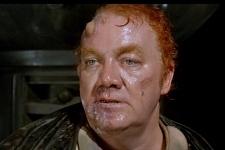
I must admit that the DTS-HD Master Audio 5.1 soundtrack on this UK Blu-ray threw me for a loop. As soon as I realized that the video transfer had been recycled from earlier European editions of the movie, I expected that the audio would be as well. The soundtrack from the French (and later German) release is easily identifiable by a glitch in the "secret report within the Guild" scene that causes the voiceover to say "a siscrit report." Although listenable otherwise, that track sounds more like a stereo source that's been upmixed to 5.1, rather than an organic 5.1 mix. It lacks much in the way of dynamics or surround activity.
Color me surprised to discover, then, that the voiceover on this disc clearly says "a secret report" without the glitch. From what I can tell, Universal has paired up the soundtrack from the American Blu-ray with the video from the German Blu-ray. At least as far as the audio goes, this is a good thing. While it betrays some age related limitations (still only limited surround usage, and a sometimes brittle high end), the track has satisfying dynamic range and excellent clarity and fidelity of subtle auditory details.
'Dune' has a fascinating sound design. Remarkable care and attention were paid to effects such as the Guild Navigator's complex mechanical breathing/pumping noises, the faint sound of crashing waves heard through the Caladan palace walls, and the echo of a far-off wind howling through the Fremen caves. As much as audiences disliked Lynch's use of hushed whispers for thought voiceovers, every one is perfectly intelligible, down to minute nuances in inflection.
This begs one obvious question, though: If Universal UK had access to the materials from the American Blu-ray edition, why did it bother to license the inferior German video master?
Special Features
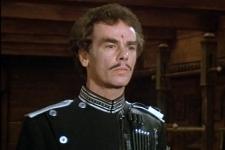
Universal's UK Blu-ray edition doesn't carry over any of the bonus features from Universal's American Blu-ray. Instead, the studio has licensed some material that previously appeared on the British Special Edition DVD release from Sanctuary Visual Entertainment.
- Impressions of Dune (PAL SD, 38 min.) – This excellent retrospective featurette has recent (circa 2005) interviews with star Kyle MacLachlan, producer Raffaella DeLaurentiis, cinematographer Freddie Francis (who passed away in 2007) and others involved in the original production. Also present are two of the movie's biggest defenders, science fiction author Harlan Ellison and film critic David Ansen.
- Destination Dune (PAL SD, 6 min.) – This 1983 promotional featurette never actually saw release until the British DVD. The short piece may not be terribly exciting, but it provides an interesting glimpse at the crew at work on set and a brief look at the excised Caladan garden scene.
- Trailer (PAL SD, 3 min.) – This cropped trailer is in terrible condition.
HD Bonus Content: Any Exclusive Goodies in There?
I own a lot of different video copies of 'Dune'. As far as I'm aware, the following interview appears for the first time here. I suspect that it was conducted for the Sanctuary DVD but cut due to time constraints.
- Golda Offenheim Interview (PAL SD, 26 min.) – This interview with the movie's production coordinator was recorded in 2003. (Sadly, she passed away in 2007.) Offenheim describes her duties on the film, discusses the difficult logistics of shooting in Mexico at the time, and tells the story of a cameraman's accident on set. She describes David Lynch as "a crackpot but a genius," and says that she found Frank Herbert to be a strange and difficult man. Despite initially trying to dodge the question, Offenheim eventually admits that she didn't really care for the film, and that Lynch's other work was not for her. The elderly woman was quite a character, and this interview is priceless. I'm glad that it finally found an outlet.
The Cutting Room Floor: What Didn't Make the Blu-ray?
As mentioned above, the UK Blu-ray doesn't contain any of the supplements from the American Blu-ray. Missing are eleven deleted scenes and four short featurettes about the production. The disc also does not include the Extended Edition TV miniseries recut of the movie or any of the extra footage from it.
The UK Blu-ray edition of 'Dune' is another failed opportunity to assemble a definitive version of the movie. While the disc has a couple of good supplements (that I already happen to own on DVD), its video transfer is a step down from the American Blu-ray release and it loses important features such as the deleted scenes. The existing American Blu-ray is superior overall. I can't recommend this import for purchase except perhaps to other die-hard 'Dune' fans like myself.



